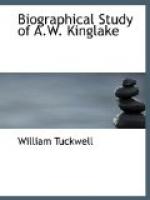Kinglake was called to the Chancery Bar, and practised apparently with no great success. He believed that his reputation as a writer stood in his way. When, in 1845, poor Hood’s friends were helping him by gratuitous articles in his magazine, “Hood’s Own,” Kinglake wrote to Monckton Milnes refusing to contribute. He will send 10 pounds to buy an article from some competent writer, but will not himself write. “It would be seriously injurious to me if the author of ‘Eothen’ were affiched as contributing to a magazine. My frailty in publishing a book has, I fear, already hurt me in my profession, and a small sin of this kind would bring on me still deeper disgrace with the solicitors.”
Twice at least in these early years he travelled. “Mr. Kinglake,” writes Mrs. Procter in 1843, “is in Switzerland, reading Rousseau.” And in the following year we hear of him in Algeria, accompanying St. Arnaud in his campaign against the Arabs. The mingled interest and horror inspired in him by this extra-ordinary man finds expression in his “Invasion of the Crimea” (ii. 157). A few, a very few survivors, still remember his appearance and manners in the forties. The eminent husband of a lady, now passed away, who in her lifetime gave Sunday dinners at which Kinglake was always present, speaks of him as sensitive, quiet in the presence of noisy people, of Brookfield and the overpowering Bernal Osborne; liking their company, but never saying anything worthy of remembrance. A popular old statesman, still active in the House of Commons, recalls meeting him at Palmerston, Lord Harrington’s seat, where was assembled a party in honour of Madame Guiccioli and her second husband, the Marquis de Boissy, and tells me that he attached himself to ladies, not to gentlemen, nor ever joined in general tattle. Like many other famous men, he passed through a period of shyness, which yielded to women’s tactfulness only. From the first they appreciated him; “if you were as gentle as your friend Kinglake,”




